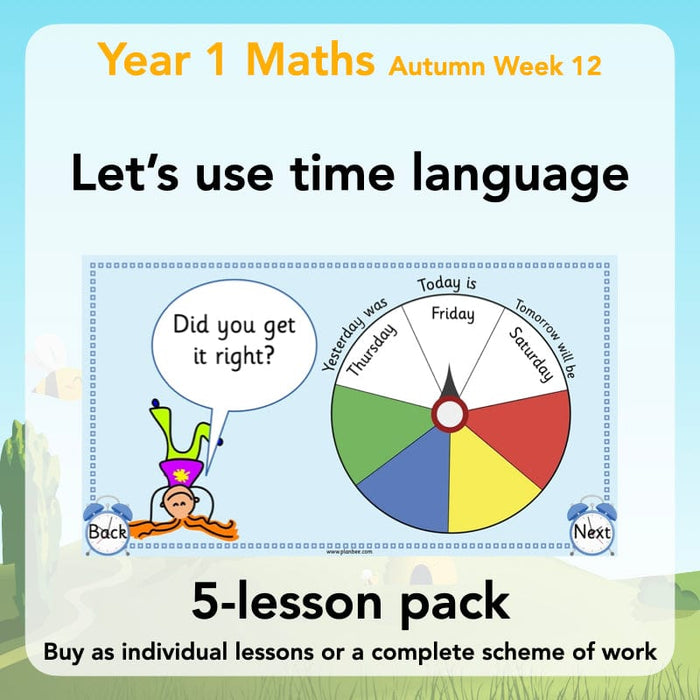

This ready-to-teach Let's Use Time Language Maths scheme of work for Year 1 is the perfect way to introduce your KS1 class to the concept of time. As well as learning sequencing words and how to order events using time language, your class will also become more familiar with the days of the week and months of the year.
Each of these five lessons comes with a detailed lesson plan with differentiated activity ideas and an alternative activity suggestion, a fun slideshow for the whole-class input to guide your class through the teaching points, and a range of printable resources to support your class as they learn how to use time language independently.
Morning Routines
This first lesson in the series introduces your class to sequencing, what it is and what language is used to describe sequencing events. The children will compare a typical morning routine with their own and enjoy completing activities to sort a morning routine into chronological order as well as sequencing the life cycle of a chick, familiar stories and nursery rhymes.
What's included:
- Lesson plan
- Slides
- Activity ideas
- Differentiated worksheets
- Morning routine A/B
- Life cycle of a chick
- Routine sentences
- Photo sheet
Afternoon Routines
Now that your class are beginning to become familiar with time language and sequencing they will enjoy sorting a typical afternoon routine into chronological order. The children will also have fun sequencing a well-known traditional tale, the life cycle of a frog and how to make a cheese salad sandwich.
What's included:
- Lesson plan
- Slides
- Activity ideas
- Differentiated worksheets
- Afternoon routine A/B/C
- Life cycle of frog
- Photo sheet
Days of the Week
Teach the days of the week to your class through fun and challenging activities, such as reordering the days, continuing on patterns, reading clues and matching the correct day and finally playing a days of the week game.
What's included:
- Lesson plan
- Slides
- Activity ideas
- Differentiated worksheets
- Time connective words
- Days of the week
- Days of the week game
- Photo sheet
Months of the Year
Explore the months of the year with your class and introduce the children to the seasons. They will have lots of fun playing games to challenge them to say which month comes before and after, a months of the year game and finally completing sequencing challenges in teams.
What's included:
- Lesson plan
- Slides
- Activity ideas
- Differentiated worksheets
- Days of the week
- Months of the year A/B/C
- Months of the year game
- Photo sheet
Sequencing Events
The children will enjoy a wide range of sequencing activities to apply the knowledge they have acquired during the week. They will explore several activities putting events into chronological order such as the life cycle of a butterfly, how to make cupcakes as well as an exciting group activity to sequence their birthdays.
What's included:
- Lesson plan
- Slides
- Activity ideas
- Differentiated worksheets
- Our class calendar
- Life cycle of a butterfly
- Cupcake sequencing
- Photo sheet


























































